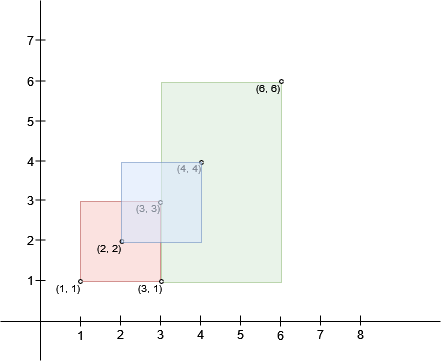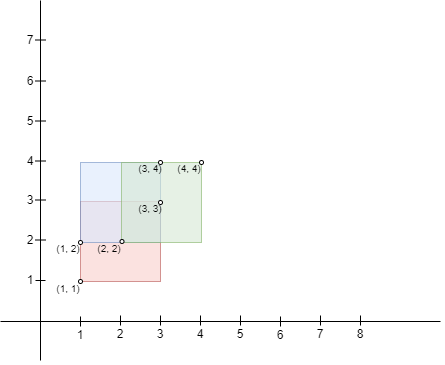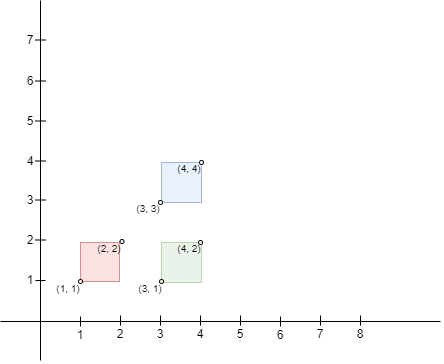Welcome to Subscribe On Youtube
3047. Find the Largest Area of Square Inside Two Rectangles
Description
There exist n rectangles in a 2D plane. You are given two 0-indexed 2D integer arrays bottomLeft and topRight, both of size n x 2, where bottomLeft[i] and topRight[i] represent the bottom-left and top-right coordinates of the ith rectangle respectively.
You can select a region formed from the intersection of two of the given rectangles. You need to find the largest area of a square that can fit inside this region if you select the region optimally.
Return the largest possible area of a square, or 0 if there do not exist any intersecting regions between the rectangles.
Example 1:

Input: bottomLeft = [[1,1],[2,2],[3,1]], topRight = [[3,3],[4,4],[6,6]] Output: 1 Explanation: A square with side length 1 can fit inside either the intersecting region of rectangle 0 and rectangle 1, or the intersecting region of rectangle 1 and rectangle 2. Hence the largest area is side * side which is 1 * 1 == 1. It can be shown that a square with a greater side length can not fit inside any intersecting region.
Example 2:

Input: bottomLeft = [[1,1],[2,2],[1,2]], topRight = [[3,3],[4,4],[3,4]] Output: 1 Explanation: A square with side length 1 can fit inside either the intersecting region of rectangle 0 and rectangle 1, the intersecting region of rectangle 1 and rectangle 2, or the intersection region of all 3 rectangles. Hence the largest area is side * side which is 1 * 1 == 1. It can be shown that a square with a greater side length can not fit inside any intersecting region. Note that the region can be formed by the intersection of more than 2 rectangles.
Example 3:

Input: bottomLeft = [[1,1],[3,3],[3,1]], topRight = [[2,2],[4,4],[4,2]] Output: 0 Explanation: No pair of rectangles intersect, hence, we return 0.
Constraints:
n == bottomLeft.length == topRight.length2 <= n <= 103bottomLeft[i].length == topRight[i].length == 21 <= bottomLeft[i][0], bottomLeft[i][1] <= 1071 <= topRight[i][0], topRight[i][1] <= 107bottomLeft[i][0] < topRight[i][0]bottomLeft[i][1] < topRight[i][1]
Solutions
Solution 1
-
class Solution { public long largestSquareArea(int[][] bottomLeft, int[][] topRight) { long ans = 0; for (int i = 0; i < bottomLeft.length; ++i) { int x1 = bottomLeft[i][0], y1 = bottomLeft[i][1]; int x2 = topRight[i][0], y2 = topRight[i][1]; for (int j = i + 1; j < bottomLeft.length; ++j) { int x3 = bottomLeft[j][0], y3 = bottomLeft[j][1]; int x4 = topRight[j][0], y4 = topRight[j][1]; int w = Math.min(x2, x4) - Math.max(x1, x3); int h = Math.min(y2, y4) - Math.max(y1, y3); int e = Math.min(w, h); if (e > 0) { ans = Math.max(ans, 1L * e * e); } } } return ans; } } -
class Solution { public: long long largestSquareArea(vector<vector<int>>& bottomLeft, vector<vector<int>>& topRight) { long long ans = 0; for (int i = 0; i < bottomLeft.size(); ++i) { int x1 = bottomLeft[i][0], y1 = bottomLeft[i][1]; int x2 = topRight[i][0], y2 = topRight[i][1]; for (int j = i + 1; j < bottomLeft.size(); ++j) { int x3 = bottomLeft[j][0], y3 = bottomLeft[j][1]; int x4 = topRight[j][0], y4 = topRight[j][1]; int w = min(x2, x4) - max(x1, x3); int h = min(y2, y4) - max(y1, y3); int e = min(w, h); if (e > 0) { ans = max(ans, 1LL * e * e); } } } return ans; } }; -
class Solution: def largestSquareArea( self, bottomLeft: List[List[int]], topRight: List[List[int]] ) -> int: ans = 0 for ((x1, y1), (x2, y2)), ((x3, y3), (x4, y4)) in combinations( zip(bottomLeft, topRight), 2 ): w = min(x2, x4) - max(x1, x3) h = min(y2, y4) - max(y1, y3) e = min(w, h) if e > 0: ans = max(ans, e * e) return ans -
func largestSquareArea(bottomLeft [][]int, topRight [][]int) (ans int64) { for i, b1 := range bottomLeft { t1 := topRight[i] x1, y1 := b1[0], b1[1] x2, y2 := t1[0], t1[1] for j := i + 1; j < len(bottomLeft); j++ { x3, y3 := bottomLeft[j][0], bottomLeft[j][1] x4, y4 := topRight[j][0], topRight[j][1] w := min(x2, x4) - max(x1, x3) h := min(y2, y4) - max(y1, y3) e := min(w, h) if e > 0 { ans = max(ans, int64(e)*int64(e)) } } } return } -
function largestSquareArea(bottomLeft: number[][], topRight: number[][]): number { let ans = 0; for (let i = 0; i < bottomLeft.length; ++i) { const [x1, y1] = bottomLeft[i]; const [x2, y2] = topRight[i]; for (let j = i + 1; j < bottomLeft.length; ++j) { const [x3, y3] = bottomLeft[j]; const [x4, y4] = topRight[j]; const w = Math.min(x2, x4) - Math.max(x1, x3); const h = Math.min(y2, y4) - Math.max(y1, y3); const e = Math.min(w, h); if (e > 0) { ans = Math.max(ans, e * e); } } } return ans; } -
impl Solution { pub fn largest_square_area(bottom_left: Vec<Vec<i32>>, top_right: Vec<Vec<i32>>) -> i64 { let mut ans: i64 = 0; let n = bottom_left.len(); for i in 0..n { let x1 = bottom_left[i][0]; let y1 = bottom_left[i][1]; let x2 = top_right[i][0]; let y2 = top_right[i][1]; for j in (i + 1)..n { let x3 = bottom_left[j][0]; let y3 = bottom_left[j][1]; let x4 = top_right[j][0]; let y4 = top_right[j][1]; let w = (x2.min(x4) - x1.max(x3)) as i64; let h = (y2.min(y4) - y1.max(y3)) as i64; let e = w.min(h); if e > 0 { ans = ans.max(e * e); } } } ans } }